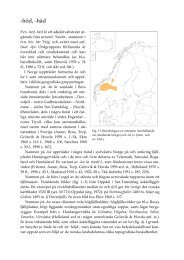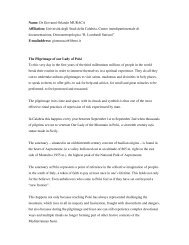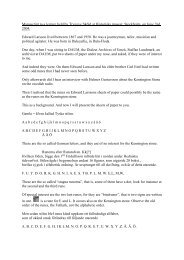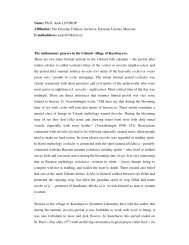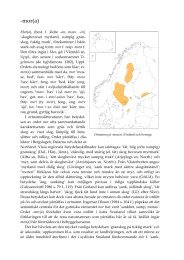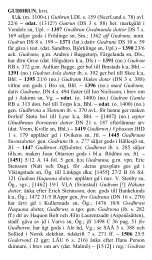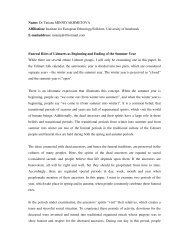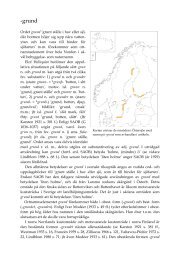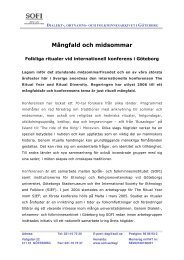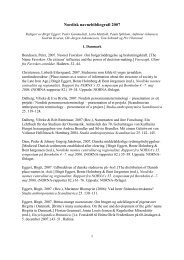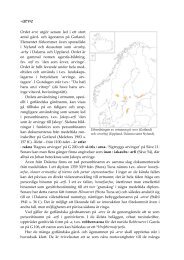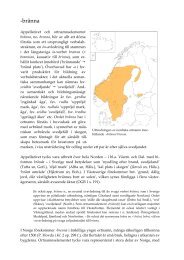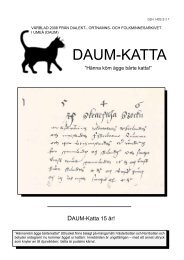NORNA-RAPPORTER 88 Binamn. Uppkomst, bildning, terminologi ...
NORNA-RAPPORTER 88 Binamn. Uppkomst, bildning, terminologi ...
NORNA-RAPPORTER 88 Binamn. Uppkomst, bildning, terminologi ...
Create successful ePaper yourself
Turn your PDF publications into a flip-book with our unique Google optimized e-Paper software.
Bynames as an expression of identity 37<br />
cates, and all legal documents. One will not be able to function in modern society<br />
without them. That projected onymic identity is relatively fixed. Other additional<br />
names gathered over time by any name carrier, expands this identity,<br />
and manages to project the name carrier in a more rounded and multifaceted<br />
way. It suggests that the given names are considered restrictive and only effective<br />
in certain (more formal) contexts, not able to express the different emotive<br />
nuances that bynames can do. These bynames are mostly embraced by the<br />
name carriers, suggesting that they themselves realise the potential contained<br />
in bynames in portraying identity features of which they approve. At the same<br />
time it should be kept in mind that not all bynames are popular with name carriers,<br />
often referring to a feature or event the name carrier would not like to be<br />
reminded of. It is in a sense then ‘imposed’ identity, although the motivation<br />
for its creation did or still does exist.<br />
This project is still ongoing and findings and interpretations are likely to be<br />
refined and adjusted. It should hopefully be completed through the course of<br />
2011. It is, however, clear, that bynames constitute a very important category<br />
in onomastics and deserve the focus of name scholars.<br />
Bibliography<br />
Bauman, Z., 1996: Morality in the age of contingency. In: Detraditionalization. Critical<br />
reflections on authority and identity. Ed. by Paul Heelas, Scott Lash & Paul Morris.<br />
Oxford, p. 49–58.<br />
Brendler, Silvio, 2008: Probleme und Möglichkeiten der Entwicklung der Onomastischen<br />
Terminologie. In: Acta Onomastica 49, p. 50–59.<br />
Brennen, Tim, 2000: On the meaning of personal names: A view from cognitive psychology.<br />
In: Names 48, p. 139–146.<br />
Die Burger – Afrikaans daily in the Western Cape, 6 May 2005.<br />
Combrink, J., 1987: Aspekte van emotiewe aanspreekvorme in die Afrikaanse literatuur.<br />
In: Nomina Africana 1(1), p. 39–72.<br />
Dalberg, Vibeke, 2000: Apparently identical terms for ‘personal by-name’. In: Onomastik.<br />
Akten des 18. Internationalen Kongresses für Namenforschung. Trier, 12.–17.<br />
April 1993. 2. Namensysteme im interkulturellen Vergleich. In Zusammenarbeit mit<br />
Rudolf Srámek hrsg. von Dieter Kremer. Tübingen, p. 36–40.<br />
De Klerk, Vivian & Bosch, Barbara, 1997: Nicknaming among Xhosa-speaking children<br />
and adolescents. In: South African journal of African languages 17(3), p. 95–99.<br />
De Stadler, L., 1985: Sosiolinguistiese aspekte van die persoonseienaam. In: Logos 5(1/<br />
2), p. 18–29.<br />
Felecan, Daiana, 2009: Nicknames. Reflections of polyphony within the linguistic area<br />
from the Northwestern part of Romania. Unpublished paper read at the 15th International<br />
Names Society of Southern Africa held at the University of KwaZulu-Natal,<br />
July 2009.<br />
Fokker, A. A., 1960: Expressive derivation of proper names in Russian. In: Lingua 9, p.<br />
267–276.<br />
Landman, K. J. H., 1986: Byname. In: Names 1983. Proceedings of the Second Southern<br />
African Names congress 13–15 September 1983. Ed. by P. E. Raper. Pretoria, p.<br />
167–177.<br />
Neethling, Bertie, 2005: Naming among the Xhosa of South Africa. New York.



